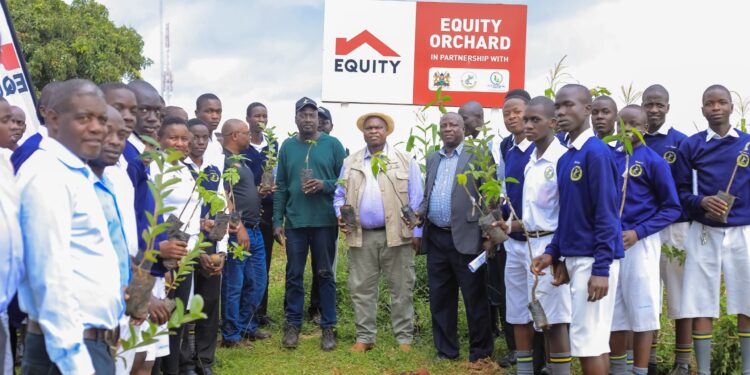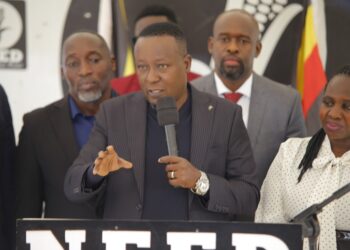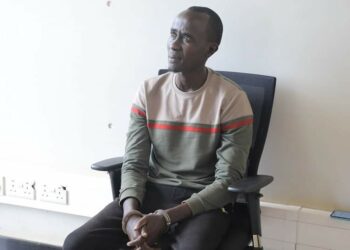Equity Bank, in collaboration with the Kenya High Commission, has embarked on an ambitious tree-planting initiative aimed at restoring the once-lush forest cover of Mwiri Hill, home to Busoga College Mwiri. This second phase of the project, launched today, will see 43,000 indigenous trees planted over 40 acres, including an expansive 10-acre orchard.
The ceremony, led by Kenya’s High Commissioner to Uganda, Joash Maangi, and Equity Bank’s Acting Head of Social Investment Projects, Elizabeth Wahito, brought together members of the Old Boys Association, school officials, community members, and Equity Bank representatives. The initiative, which is part of a larger three-phase project funded by Equity Bank to the tune of Shs85 million, aims to rejuvenate 110 acres of forest cover on Mwiri Hill.
“Equity is keen to see that the original forest cover of Mwiri Hill is restored by planting 110 acres of indigenous trees,” Wahito announced at the event. “This is the second phase; the first, conducted in March this year, covered 40 acres along with 10 acres of orchard. Today, we continue that journey with another 40 acres. I urge the community and teachers to protect these trees and help them thrive for the benefit of future generations.”
Commissioner Maangi underscored the urgency of addressing climate change through such reforestation projects. “When you hear about climate change, you realize it didn’t use to rain like this. Now, the rain comes haphazardly—you never know when it will start. Protecting our environment is essential, and this project at Mwiri is part of that larger effort,” he said.
He also highlighted the Kenya High Commission’s previous environmental commitments, including last year’s regional conference on sustainability. “The school gave us 110 acres, but we soon realized the significant cost involved in planting trees, so we approached Equity Bank for support. Their partnership has been invaluable.”
The first phase of the project began during the rainy season in March, planting 40 acres of indigenous trees. The final phase is planned for March and April of next year, targeting the last 30 acres.
Equity Bank’s comprehensive environmental strategy aligns with its Energy and Environment pillar, which promotes sustainable practices, reduces dependence on wood fuel, and supports clean energy solutions through initiatives like the Equi-Green Loan. This energy loan is available digitally and at bank branches, helping communities and institutions access clean, affordable energy.
The broader reforestation effort is part of Equity Group’s commitment to planting 35 million trees across the six countries in which it operates. Technical partners are tasked with identifying priority areas for reforestation, mapping suitable ecological zones, sourcing high-quality seedlings, and supervising the planting process to ensure the trees’ survival.
Wahito detailed Equity’s dual focus on social and economic programs. “Our tree planting is not an isolated project; it ties into our wider investment in community upliftment, including leadership and mentorship programs for students,” she said.
Uganda’s Forestry cover is gradually increasing having decreased from 24 per cent in 1990 to 8.9 per cent of 2017. This is attributed to the commitment of multiple stakeholders doing tree growing across the country.
Busoga College Mwiri sits on the slopes of Mwiri hill. The slopes of the hill on which the school was built were once a forest but have over the years been degraded due to encroachment by farmers and commercial activities. These human activities have left the hills bear and prone to erosion.
The reforestation of Mwiri Hill is part of the wider Equity Group target to plant 35 million trees across the six countries it operates in. Its technical partners will provide technical support including the Identification of hotspots that require urgent tree cover or rehabilitation of degraded forests; mapping out agro-ecological zones and identification of suitable tree species for planting; identification of high-quality tree seedlings stocks across the country; and support by partner and staff at local levels to supervise the proper planting and maintenance of the trees.
Through its Energy and Environment pillar, Equity Bank supports the transition to clean energy that reduces reliance on wood fuel, charcoal, and fossil fuels like kerosene as a source of energy.
To reach a larger scale and create more impact, the Bank also created an energy loan dubbed Equi-Green Loan available digitally via mobile network and at branches. The loan supports the community and institutions to access clean and affordable energy for use.
Do you have a story in your community or an opinion to share with us: Email us at editorial@watchdoguganda.com













